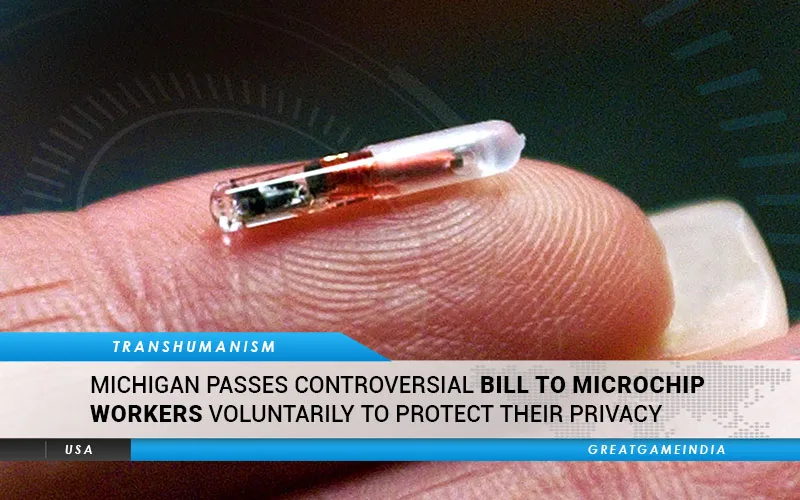Tja wat
kan daar op tegen zijn, denk je als je deze kop leest, immers het
'microchipping' gebeurt op vrijwillige basis. Als het om Nederland zou gaan zou
dit misschien opgaan, immers geen vakbond zou akkoord gaan met een
bedrijf dat als voorwaarde tot indienstneming van nieuwe medewerkers eist
dat deze zich een microchip laten inbrengen, als er al een bedrijf
zou zijn dat dit zou eisen...... (hoewel als je ziet dat de
FNV het pensioenakkoord heeft goedgekeurd*, een schande vanjewelste, behoef je
nergens meer van op te kijken.....)
In de VS
is dit een heel ander verhaal en een bedrijf dat op grond van deze
wet van haar werknemers eist dat ze zich laten 'chippen', zal uiteindelijk geen
strobreed in de weg worden gelegd...... Er wordt weliswaar gesteld dat werknemers niet gedwongen kunnen worden, maar reken maar dat dit binnen de kortste keren zal gebeuren, zeker als er op het sollicitatieformulier wordt gevraagd of je bezwaar hebt tegen zo'n chip. Als je dat wel hebt zal je verder niet worden uitgenodigd, ofwel het overgrote deel van de sollicitanten zal hier in feite onder druk mee akkoord gaan (zeker daar het nu moeilijk is een baan te vinden in de inhumane ijskoude neoliberale VS...)....
Het meest lullige is wel dat men stelt met deze microchip de privacy beter te kunnen waarborgen..... ha! ha! ha! ha! ha! Belachelijk en totaal ongeloofwaardig!! Verder wordt gesteld dat e.e.a. zal leiden tot een grotere efficiency en betere arbeidsproductiviteit >> precies dat is de bedoeling en niet het waarborgen van de privacy, immers met zo'n chip worden juist meerdere burgerrechten geschonden.......
Het meest lullige is wel dat men stelt met deze microchip de privacy beter te kunnen waarborgen..... ha! ha! ha! ha! ha! Belachelijk en totaal ongeloofwaardig!! Verder wordt gesteld dat e.e.a. zal leiden tot een grotere efficiency en betere arbeidsproductiviteit >> precies dat is de bedoeling en niet het waarborgen van de privacy, immers met zo'n chip worden juist meerdere burgerrechten geschonden.......
Uit
walgelijke dierproeven blijkt dan ook nog eens dat deze microchips
kanker veroorzaken....
Het
monster Gates is voorstander van het chippen van de hele
wereldbevolking, tel dit op bij zijn pleidooi om mensen die in de nabije
toekomst gevaccineerd zijn tegen COVID-19, een vaccinatiepaspoort
moeten hebben, om nog deel te kunnen nemen aan de dagelijkse gang van
zaken en je snapt dat we ons uit alle macht moeten verzetten tegen
het chippen van mensen........
Het
chippen van mensen zou verboden moeten worden, dit is de weg naar een
maatschappij waarmee vergeleken het boek 1984 van George Orwell nog
kinderspel is.....
Het volgende artikel over deze zaak
komt van Zero Hedge, dat het overnam van
GreatGameIndia.com:
Michigan Passes Controversial Bill To Microchip Humans Voluntarily "To Protect Their Privacy"
by
Tyler Durden
Sat,
07/04/2020 - 21:40
The Michigan House of Representatives has passed a controversial bill to microchip humans voluntarily in the state under the guise of protecting their privacy. The Microchip Protection Act would allow Michigan employers to use microchipping of their workers with their consent. However, research has shown that RFID transponders causes cancer.

“With the way technology has increased over the years and as it continues to grow, it’s important Michigan job providers balance the interests of the company with their employees’ expectations of privacy.”
“Microchipping has been brought up in many conversations as companies across the country are exploring cost-effective ways to increase workplace efficiency. While these miniature devices are on the rise, so are the calls of workers to have their privacy protected.”
- Rep. Bronna Kahle, the Republican who sponsored the bill, said in a press statement.Radio-frequency identification tags, commonly referred to as microchips, are beginning to seep into the marketplace as new technological devices to help streamline everyday business practices. The chips, roughly the size of a grain of rice, are implanted into the hands of employees and act as a replacement for I.D. badges, timecards, usernames and passwords for security clearance, and even credit cards.
“Despite this type of technology not quite making its way into our state yet, I wouldn’t be surprised if it becomes a standard business practice statewide within the next few years,” Kahle said.
“We should absolutely take every step possible to get ahead of these devices.”Under Kahle’s plan, Michigan employers would be able utilize microchipping, but could not mandate employees to have such devices implanted. Kahle said the measure strikes a good balance between protecting workers’ rights and providing businesses with flexibility to increase efficiency and further grow.
However, research has shown that RFID transponders causes cancer. Research has suggested 90 percent of Americans are uncomfortable with microchipping mostly due to studies that suggested a link between RFID transponders and cancer in lab animals.
In May, the plan to chip humans globally through a digital ID was exposed in the Italian Parliament. Sara Cunial, the Member of Parliament for Rome denounced Bill Gates as a “vaccine criminal” and urged the Italian President to hand him over to the International Criminal Court for crimes against humanity. She also exposed Bill Gates’ agenda in India and Africa, along with the plans to chip the human race through the digital identification program ID2020.
================================
* Het pensioenakkoord waarmee pensioenfondsen nog veel meer gespaarde gelden mogen vergokken op de beurs, de reden dat al een gigantische hoop geld is verdwenen, geld gespaard door werknemers....... Wat dit voor werkgevers betekend heb ik nog niet kunnen vinden echter ik meen te hebben begrepen dat dezen minder hoeven bij te dragen aan de pensioenen voor werknemers. Als je daarover informatie hebt meldt dit dan ajb, of onder dit bericht, dan wel via mijn mail: trippleu@gmail.com
Voor meer berichten over privacy, burgerrechten, microchips, pensioenakkoord, pensioen, hervorming pensioenen, het FNV en/of het Coronavirus, klik op het betreffende label, direct onder dit bericht.






